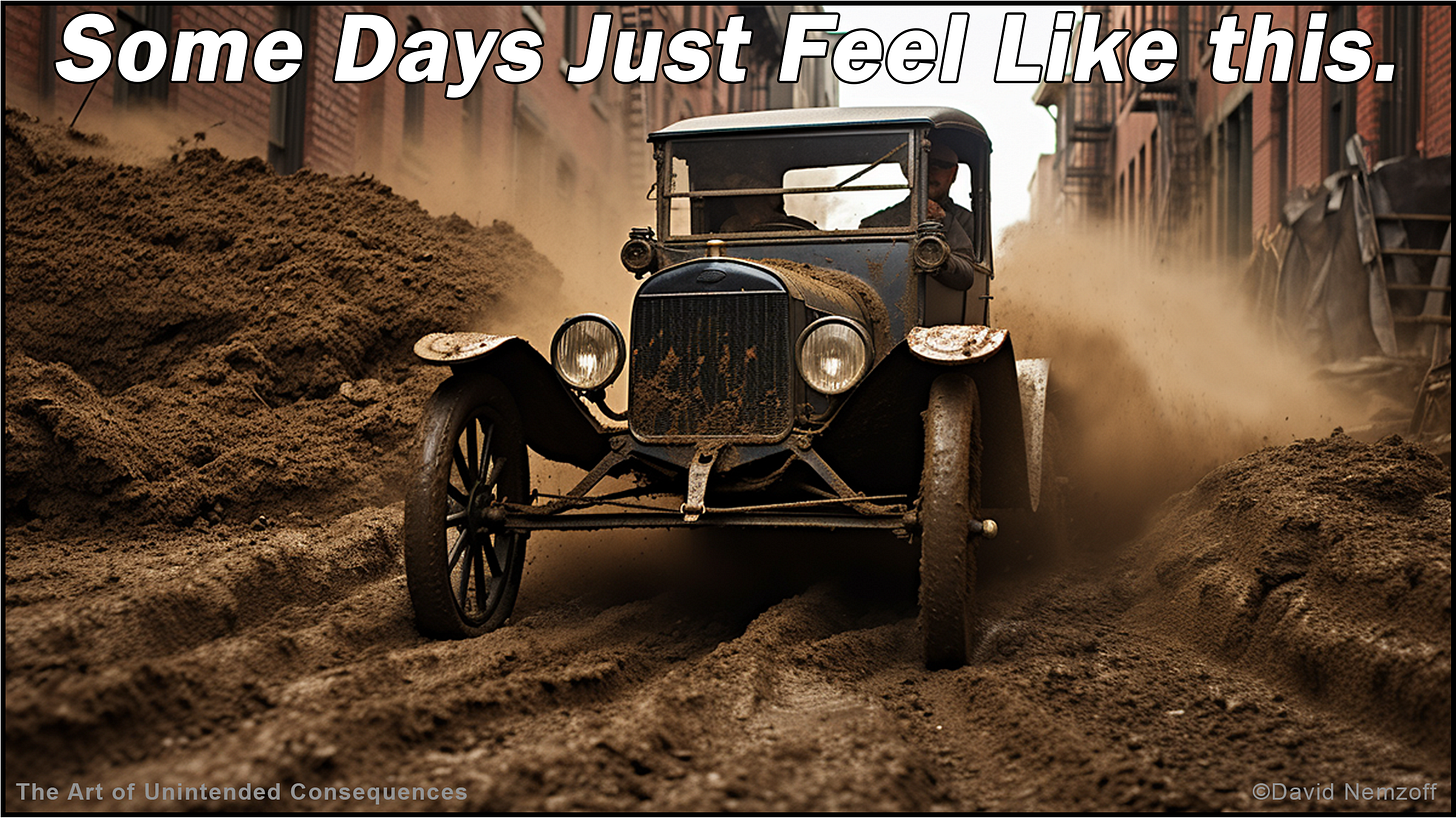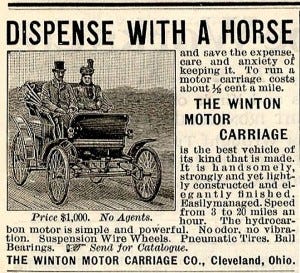You may have heard a lot of stories and theories about what drove Henry Ford to develop the Model T and his process for mass production of an “automobile”. But I have to admit that this one is not only entertaining but makes a great Unintended Consequence.
Head down and watch your step as we take this journey.
Poop, The Next Frontier
We deal with many crises in the modern age, but none quite so smelly as the “Great Horse Manure Crisis of 1894”. [Yes, that was an actual thing.]
130+ years ago, most major cities of the world faced an unforeseen predicament that quickly became overwhelming and dangerous. As the populations in cities grew, so did the number of horses needed for transportation and services within the city. NYC alone had a population of more than 100,000 horses that produced a total of 2.5 million pounds of manure PER DAY!
It was an environmental crisis of previously unknown proportions!
Imagine this. If an individual worker could scoop and cart 1,000 pounds of manure out of the city per day, it would require 2,500 people doing the same every single day. Of course, using their own horses only added to the problem. It was an untenable and unsustainable proposition.
This malodourous problem that carpeted the streets would continue to grow as the cities expanded, creating numerous catastrophic problems:
Disease-spreading flies enjoyed a bounty of booty, while being a nuisance and spreading typhoid fever and other diseases.
Horse carcasses blocked traffic, added to the cacophony of smells, attracted more flies, and were very slow to be dealt with.
Manure and huge quantities of horse urine created a health hazard through unsanitary conditions.
The economic cost of removing manure and carcasses was a significant burden on the cities and would only get worse with time.
Walking was a hazard for anyone not wearing boots.
And, of course, this was a great hazard to the reelections of politicians who always promised to fix the problem, but never did.
The Rosy Side of Poop
There is no way to make this problem smell better, but with adversity, particularly in America, comes innovation. Numerous business opportunities presented themselves by the ton for those with no sense of smell:
2,500,000 pounds of manure generated in NYC alone EVERY day.
Who was going to collect, transport, and dispose of all that manure?
Many would sell the manure to farms around the city, but the market quickly became over-fertilized.
100,000 horses with an average lifespan for city workhorses of 3 years meant a lot of horse deaths.
Only the most hearty of souls could take on this task, but who was going to pay them to deal with up to 90 carcasses per day that were often left to rot in the streets?
The demand for Shoe-Shine boys grew in proportion to the depth of poop and created a massive industry and opportunity for the youth of the city.
Street-Crossing Sweepers became a thing. If you wanted to cross the street, you tipped a Sweeper to clear the crosswalk in front of you. Within minutes, the crosswalk would be covered again - creating job security.
Numerous industries were born to tackle various elements of the problem, but most only dealt with poop on a micro basis, not a macro basis.
The problem kept piling up (pun intended) and opportunities created were only stopgaps to plug up the problem. Hmmmm…. Plugs…..? Anyway, it was a massive undertaking. What were they do to with all that poop in the long term?
The London Times supposedly coined the term “The Great Manure Crisis of 1894” and predicted that London would be buried under NINE FEET of manure within 50 years (sound familiar?).
Interestingly, there is now a claim that the whole thing was “Fake News”. Seriously!
Some now believe that the “crisis” was made up by the car builders, especially Henry Ford, simply as “misinformation” to sell their motorcars.
A Solution Was Needed
Whatever the case, the question of the day became, “HOW do we deal with this manmade crisis of global pooping?”
The best thinkers of the time put their heads together to figure out how to reduce or remove this stinker of a problem. The best minds of the time came up with…
More efficient ways to transport the manure out of the city to other places. As you can imagine, the suburbs were very thankful.
Poop catchers on the horses to be emptied at designated poop repositories that had no way to dispose of the excess poop.
Horse-drawn Streetcars or Trams that could transport more people with fewer horses.
Horse-drawn Vacuum Cleaners (thank you, Mr. John Murray Spangler) that sucked up poop to be hauled away to become someone else’s problem.
Horse Poop Catapults to launch collected poop directly out of the city and into open areas of the countryside.
Hot Air Balloons powered by horse farts (another problem that needed to be addressed) to float the poop out to… well… wherever they landed.
You see the one common thread here was to make it someone else’s problem. Maybe that’s where the term, “Shit rolls downhill,” came from.
Horse Poop Blenders to blend the poop into a smoothie that could then be washed down the sewers. Hmm… that one might have actually worked.
Horse Poop Statues, Sculptures, Jewelry, and more to help support the starving artist class.
Okay, maybe I was just checking to see if you were still reading. I will admit under duress that maybe some of those weren’t really actually true in the sense of the word, but prove to me that someone of that time didn’t at least think about them. C’mon, be honest.
From the Horse’s Mouth
The real problem was that they were all trying to directly deal with the specific problem of too much poop. These magnificent words, “paradigm shift” had not been invented yet so nobody was looking at the source and how to deal with poop at the manufacturing level —> the HORSE itself.
Horses were just the way things were done and were always included in the equation. Very few were looking at how to get rid of the horse… just the poop (and urine, which was quite pungent and annoying on its own). Seriously, have you ever seen a horse pee on a paved street? Step back, it’s quite spectacular. But I digress…
The conundrum then becomes, WAS the problem of the manufacturing of poop solved by Henry Ford’s idea, or did Henry Ford determine to combine the automobile with the assembly line to mass produce his Model T BECAUSE he wanted to do something about all the poop?
Likely it was a bit of both with entrepreneurial insight mixed in for good measure. But I like to believe that the river of poop in the streets of NYC drove the society-changing impact of the mass production of automobiles. It makes a better story.
Throughout this period there were many entrepreneurs building automobiles in the hopes of getting people to adopt them, but they were all built one-by-one and it was slow going to convince the public. You would think the cities would be a ripe (get it?) market for this innovation. But part of the problem with adoption was the poop itself.
Would these motor cars with poor mechanics be able to drive through the shag carpet of manure? It was obvious the working parts and interiors would quickly become caked in poop and urine - it’s not as fun as it sounds. And when the automobile inevitably broke down, guess what you would be wallowing in to try and fix it?
Remember, there was no AAA at the time.
So along comes Henry Ford. He did NOT invent the automobile or the assembly line. But like most good entrepreneurs, he merged the two concepts together and changed the world.
Now all he had to do was convince city dwellers that his mass-produced motor car would solve the poop problem. Hmmm… maybe there was something to the “Fake News” issue.
Obviously, Henry Ford was quite successful, as were others. In the early 1900s, motor cars and trucks were gaining traction and electric streetcars were taking more and more people from here to there. By 1917 or so, horses in the city were an anomaly.
The smell of poop and urine in the city streets became a distant memory (until recent years, but again, that is a whole other story). Progress had come and the earthy wonder of manure smell in the cities was replaced by the delightful aroma of fresh petrol belched into the air of the city by these early automobiles.
The Unintended Consequences
This was a major change in the very nature of city life and resulted in many intended and unintended consequences - both good and bad.
What were the BAD Unintended Consequences?
Most of those poor shoeshine boys became unemployed.
All of the Crosswalk Sweepers were now standing in bread lines.
99% of the horses became unemployed. Some went to farms upstate. Others took on “factory” work… if you know what I mean. Elmer’s anyone?
People could tell now when you farted or shart yourself.
The Poop Catapult never came to fruition.
What were the GOOD Unintended Consequences initiated by Henry Ford?
Most of the disease carrying flies in the city were unemployed.
Life expectancies likely improved.
Glue was in abundant supply.
The stink of manure was replaced by stink of leaded petrol (an acquired taste).
People could now complain incessantly around the water cooler about man-made pollution and quit blaming the horses.
Jobs on the automobile manufacturing lines were plentiful.
The Poop Catapult never came to fruition.
After all that, all I can say is that it’s wonderful to be living in today’s modern society. I love life without our city streets overflowing with poop. Let’s keep it on the sidewalks where it belongs.
Life is wonderfully clean these days, but I do wonder what people will think 130 years from now when they look back on how we live today.
David Nemzoff
Author and Consultant
https://www.gabberz.com
https://www.linkedin.com/in/nemzoff/
https://twitter.com/DNemzoff
https://www.facebook.com/david.nemzoff
Author of “Public Speaking for Kids, Tweens, and Teens - Confidence for Life!”
COMING SOON to a bookseller near you, my latest book exploring the crisis in our K-12 Educational System. Is it time for The Great Education Reset?









Thanks for making me think about something that never entered my mind. 100,000 horses. Amazing.